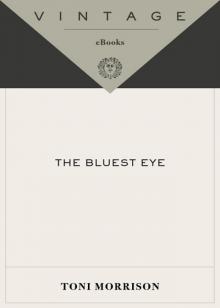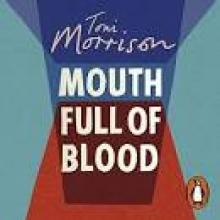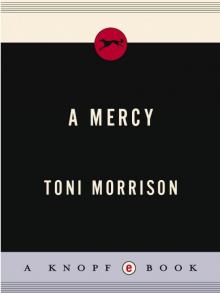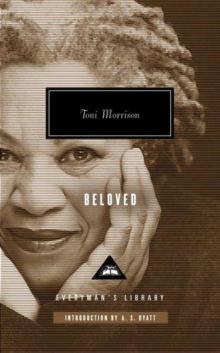- Home
- Toni Morrison
God Help the Child: A novel Page 2
God Help the Child: A novel Read online
Page 2
The couple of times I drove to Decagon before, I never tried to get inside on some pretext or other. Back then I just wanted to see where the lady monster—that’s what they called her—had been caged for fifteen of her twenty-five-to-life sentence. This time was different. She has been granted parole and, according to penal review notices, Sofia Huxley is going to strut through the bars I pushed her behind.
You’d think with Decagon being all about corporate money that a Jaguar wouldn’t stand out. But behind the curbside buses, old Toyotas and secondhand trucks, my car, sleek, rat gray with a vanity license, looked like a gun. But it was not as sinister as the white limousines I’ve seen parked there—engines snoring, chauffeurs leaning against gleaming fenders. Tell me, who would need a driver leaping to open the door and make a quick getaway? A grand madam impatient to get back to her designer linens in her tasteful high-rise brothel? Or maybe a teenage hookerette eager to get back to the patio of some sumptuous, degenerate private club where she could celebrate her release among friends by ripping up her prison-issue underwear. No Sylvia, Inc., products for her. Our line is sexy enough but not expensive enough. Like all sex trash, the little hookerette would think the higher the price, the better the quality. If she only knew. Still, she might buy some YOU, GIRL sparkle eye shadow or gold-flecked lip gloss.
No limousines today, unless you count the Lincoln town car. Mostly just worn Toyotas and ancient Chevys, silent grown-ups and jittery children. An old man sitting at the bus stop is digging into a box of Cheerios, trying to find the last circle of sweet oat bran. He’s wearing ancient wing-tip shoes and crisp new jeans. His baseball cap, his brown vest over a white shirt, scream Salvation Army store but his manner is superior, dainty, even. His legs are crossed and he examines the bit of dry cereal as though it were a choice grape picked especially for him by groundskeepers to the throne.
Four o’clock; it won’t be long now. Huxley, Sofia, a.k.a. 0071140, won’t be released during visiting hours. At exactly four-thirty only the town car is left, owned probably by a lawyer with an alligator briefcase full of papers, money and cigarettes. The cigarettes for his client, the money for witnesses, the papers to look like he’s working.
“Are you okay, Lula Ann?” The prosecutor’s voice was soft, encouraging, but I could barely hear her. “There’s nothing to be afraid of. She can’t hurt you.”
No, she can’t and, damn, here she is. Number 0071140. Even after fifteen years I could never mistake her simply because of her height, six feet at least. Nothing has shrunk the giant I remember who was taller than the bailiff, the judge, the lawyers and almost as tall as the police. Only her co-monster husband matched her height. Nobody doubted she was the filthy freak that parents shaking with anger called her. “Look at her eyes,” they whispered. Everywhere in the courthouse, ladies’ room, on benches lining the halls they whispered: “Cold, like the snake she is.” “At twenty? How could a twenty-year-old do those things to children?” “Are you kidding? Just look at those eyes. Old as dirt.” “My little boy will never get over it.” “Devil.” “Bitch.”
Now those eyes are more like a rabbit’s than a snake’s but the height is the same. A whole lot else has changed. She is as thin as a rope. Size 1 panties; an A-cup bra, if any. And she could sure use some GlamGlo. Formalize Wrinkle Softener and Juicy Bronze would give color to the whey color of her skin.
When I step out of the Jaguar I don’t wonder or care whether she recognizes me. I just walk over to her and say, “Need a lift?”
She throws me a quick, uninterested glance and turns her gaze to the road. “No. I don’t.”
Her mouth is trembly. It used to be hard, a straight razor sharpened to slice a kid. A little Botox and some Tango-Matte, not glitter, would have softened her lips and maybe influenced the jury in her favor except there was no YOU, GIRL back then.
“Somebody picking you up?” I smile.
“Taxi,” she says.
Funny. She is answering a stranger dutifully like she’s used to it. No “What’s it to you?” or even “Who the hell are you?” but going on to explain further. “Called a cab. I mean the desk did.”
When I come closer and reach out to touch her arm the cab rolls up and fast as a bullet she grabs the door handle, tosses in her little carrier bag and slams the door shut. I bang on the window shouting, “Wait! Wait!” Too late. The driver negotiates the U-turn like a NASCAR pro.
I rush to my car. Following them isn’t hard. I even pass the taxi to disguise the fact that I am tailing her. That turns out to be a mistake. Just as I’m about to enter the exit ramp, I see the taxi shoot ahead of me toward Norristown. Gravel pings my wheels as I brake, reverse and follow them. The road to Norristown is lined with neat, uniform houses built in the fifties and added on repeatedly—a closed side porch, a garage expanded for two cars, backyard patio. The road looks like a kindergarten drawing of light-blue, white or yellow houses with pine-green or beet-red doors sitting smugly on wide lawns. All that is missing is a pancake sun with ray sticks all around it. Beyond the houses, next to a mall as pale and sad as “lite” beer, a sign announces the beginning of the town. Next to it another, bigger sign for Eva Dean’s Motel and Restaurant. The taxi turns and stops by the entrance. She gets out and pays the driver. I follow and park a ways back near the restaurant. Only one other car is in the parking area—a black SUV. I am sure she is meeting someone, but after a few minutes at the check-in desk, she goes straight to the restaurant and takes a seat by the window. I can see her clearly and watch her study the menu like a remedial or English-as-a-second-language student—lip-reading, running her finger over the items. What a change. This is the teacher who had kindergartners cut apples into rings to shape the letter O, doled out pretzels as B’s, slit watermelon chunks into Y’s. All to spell BOY—who she liked best according to the women whispering in front of the sinks in the ladies’ room. Fruit as bait was a big part of the trial’s testimony.
Look at her eat. The waitress keeps placing plate after plate in front of her. Makes sense, sort of, this first out-of-prison meal. She’s gobbling like a refugee, like somebody who’s been floating at sea without food or water for weeks and just about to wonder what harm it would do to his dying boatmate to taste his flesh before it shrank. She never takes her eyes from the food, stabbing, slicing, scooping helter-skelter among the dishes. She drinks no water, butters no bread, as though nothing is allowed to delay her speed-eating. The whole thing is over in ten or twelve minutes. Then she pays, leaves and hurries down the walkway. Now what? Key in hand, tote bag on her shoulder, she stops and turns in to a break between two stucco walls. I get out of the car and walk-run behind her until I hear the retching sounds of vomit. So I hide behind the SUV until she comes out.
3-A is painted on the door she unlocks. I’m ready. I make sure my knock is authoritative, strong but not threatening.
“Yes?” Her voice is shaky, the humble sound of someone trained to automatic obedience.
“Mrs. Huxley. Open the door, please.”
There is silence then, “I uh. I’m sorta sick.”
“I know,” I say. A trace of judgment in my voice, hoping she thinks it’s about the sick she left on the pavement. “Open the door.”
She opens it and stands there barefoot with a towel in her hand. She wipes her mouth. “Yes?”
“We need to talk.”
“Talk?” She blinks rapidly but doesn’t ask the real question: “Who are you?”
I push past her, leading with the Louis Vuitton bag. “You’re Sofia Huxley, right?”
She nods. A tiny flash of fear is in her eyes. I’m black as midnight and dressed in all white so maybe she thinks it’s a uniform and I’m an authority of some sort. I want to calm her so I hold up the shopping bag and say, “Come on. Let’s sit down. I have something for you.” She doesn’t look at the bag or my face; she stares at my shoes with their high lethal heels and dangerously pointed toes.
“What do you want me to do?” she asks.
br /> Such a soft, accommodating voice. Knowing after fifteen years behind bars that nothing is free. Nobody gives away anything at no cost to the receiver. Whatever it is—cigarettes, magazines, tampons, stamps, Mars bars or a jar of peanut butter—it comes with strings tough as fishing line.
“Nothing. I don’t want you to do a thing.”
Now her eyes stray from my shoes to my face, opaque eyes without inquiry. So I answer the question a normal person would have posed. “I saw you leave Decagon. No one was there to meet you. I offered you a lift.”
“That was you?” She frowns.
“Me. Yes.”
“I know you?”
“My name is Bride.”
She squints. “That supposed to mean something to me?”
“No,” I say and smile. “Look what I brought you.” I can’t resist and place the bag on the bed. I reach inside and on top of the gift package of YOU, GIRL I lay two envelopes—the slim one with the airline gift certificate then the fat one with five thousand dollars. About two hundred dollars for each year if she had served her full sentence.
Sofia stares at the display as though the items might be infected. “What’s all that for?”
I wonder if prison has done something to her brain. “It’s okay,” I say. “Just a few things to help you.”
“Help me what?”
“Get a good start. You know, on your life.”
“My life?” Something is wrong. She sounds as if she needs an introduction to the word.
“Yeah.” I am still smiling. “Your new life.”
“Why? Who sent you?” She looks interested now, not frightened.
“I guess you don’t remember me.” I shrug. “Why would you? Lula Ann. Lula Ann Bridewell. At the trial? I was one of the children who—”
I search through the blood with my tongue. My teeth are all there, but I can’t seem to get up. I can feel my left eyelid shutting down and my right arm is dead. The door opens and all the gifts I brought are thrown at me, one by one, including the Vuitton bag. The door slams shut, then opens again. My black stiletto-heeled shoe lands on my back before rolling off next to my left arm. I reach for it and am relieved to learn that, unlike the right one, this one can move. I try to scream “help,” but my mouth belongs to somebody else. I crawl a few feet and try to stand. My legs work, so I gather up the gifts, push them into the bag and, one shoe on, one left behind, limp to my car. I don’t feel anything. I don’t think anything. Not until I see my face in the side-view mirror. My mouth looks as though it’s stuffed with raw liver; the whole side of my face is scraped of skin; my right eye is a mushroom. All I want to do is get away from here—no 911; it takes too long and I don’t want some ignorant motel manager staring at me. Police. There have to be some in this town. Igniting, shifting, steering with a left hand, while the other one lies dead next to my thigh, takes concentration. All of it. So it’s not until I get farther into Norristown and see a sign with an arrow pointing to the police station that it hits me—the cops will write a report, interview the accused and take a picture of my wrecked face as evidence. And what if the local newspaper gets the story along with my photograph? Embarrassment would be nothing next to the jokes directed at YOU, GIRL. From YOU, GIRL to BOO, GIRL.
Hammers of pain make it hard to get out my cellphone and dial Brooklyn, the one person I can trust. Completely.
Brooklyn
She’s lying. We are sitting in this dump of a clinic after I’ve driven over two hours to find this hick town, then I have to locate her car parked in the rear of a closed-shut police station. Of course it’s closed; it’s Sunday, when only churches and Wal-Mart are open. She was hysterical when I found her bloody and crying out of one eye, the other one too swollen to shed water. Poor thing. Somebody ruined one of those eyes, the ones that spooked everybody with their strangeness—large, slanted, slightly hooded and funny-colored, considering how black her skin is. Alien eyes, I call them, but guys think they’re gorgeous, of course.
Well, when I find this little emergency clinic facing the mall’s parking lot I have to hold her up to help her walk. She hobbles, wearing one shoe. Finally we get a nurse’s bug-eyed attention. She is startled at the pair of us: one white girl with blond dreads, one very black one with silky curls. It takes forever to sign stuff and show insurance cards. Then we sit down to wait for the on-call doctor who lives, I don’t know, far off in some other crappy town. Bride doesn’t say a word while I drive her here, but in the waiting room she starts the lie.
“I’m ruined,” she whispers.
I say, “No you’re not. Give it time. Remember what Grace looked like after her face tuck?”
“A surgeon did her face,” she answers. “A maniac did mine.”
I press her. “So tell me. What happened, Bride? Who was he?”
“Who was who?” She touches her nose tenderly while breathing through her mouth.
“The guy who beat you half to death.”
She coughs for some time and I hand her a tissue. “Did I say it was a guy? I don’t remember saying it was a guy.”
“Are you telling me a woman did this?”
“No,” she says. “No. It was a guy.”
“Was he trying to rape you?”
“I suppose. Somebody scared him off, I guess. He banged me around and took off.”
See what I mean? Not even a good lie. I push a bit more. “He didn’t take your purse, wallet, anything?”
She mumbles, “Boy Scout, I guess.” Her lips are puffy and her tongue can’t manage consonants but she tries to smile at her own stupid joke.
“Why didn’t whoever scared him off stay and help you?”
“I don’t know! I don’t know! I don’t know!”
She is shouting and fake-sobbing so I back off. Her single open eye isn’t up to it and her mouth must hurt too much to keep it up. For five minutes I don’t say a word, just flip through the pages of a Reader’s Digest; then I try to make my voice sound as normal and conversational as I can. I decide not to ask why she called me instead of her lover man.
“What were you doing up here anyway?”
“I came to see a friend.” She bends forward as though her stomach hurts.
“In Norristown? Your friend lives here?”
“No. Nearby.”
“You find him?”
“Her. No. I never found her.”
“Who is she?”
“Somebody from a long time ago. She wasn’t there. Probably dead by now.”
She knows I know she’s lying. Why wouldn’t an attacker take her money? Something has rattled her brainpan otherwise why would she tell me such fucked-up lies? I guess she doesn’t give a damn what I think. When I stuffed her little white skirt and top into the shopping bag, I found a rubber band around fifty hundred-dollar bills, an airline gift certificate and samples of YOU, GIRL not yet launched. Okay? No species of would-be rapist would want Nude Skin Glo, but free cash? I decide to let it go and wait until she’s seen the doctor.
Afterward, when Bride holds up my compact mirror to her face, I know what she sees will break her heart. A quarter of her face is fine; the rest is cratered. Ugly black stitches, puffy eye, bandages on her forehead, lips so Ubangi she can’t pronounce the r in raw, which is what her skin looks like—all pink and blue-black. Worse than anything is her nose—nostrils wide as an orangutan’s under gauze the size of half a bagel. Her beautiful unbruised eye seems to cower, bloodshot, practically dead.
I shouldn’t be thinking this. But her position at Sylvia, Inc., might be up for grabs. How can she persuade women to improve their looks with products that can’t improve her own? There isn’t enough YOU, GIRL foundation in the world to hide eye scars, a broken nose and facial skin scraped down to pink hypodermis. Assuming much of the damage fades, she will still need plastic surgery, which means weeks and weeks of idleness, hiding behind glasses and floppy hats. I might be asked to take over. Temporarily, of course.
“I can’t eat. I can’t talk. I
can’t think.”
Her voice is whiny and she is trembling.
I put my arm around her and whisper, “Hey, girlfriend, no pity party. Let’s get out of this dump. They don’t even have private rooms and that nurse had lettuce in her teeth and I doubt she’s washed her hands since graduating from that online nursing course she took.”
Bride stops shaking, adjusts the sling holding her right arm and asks me, “You don’t think that doctor did a good job?”
“Who knows?” I say. “In this trailer park clinic? I’m driving you to a real hospital—with a toilet and sink in the room.”
“Don’t they have to release me?” She sounds like a ten-year-old.
“Please. We’re leaving. Now. Look what I bought while you were being patched up. Sweats and flip-flops. No decent hospital in these parts but a very respectable Wal-Mart. Come on. Up. Lean on me. Where did Florence Nightingale put your things? We’ll get some ice pops or slurries on the way. Or a milk shake. That’s probably better medicine-wise—or some tomato juice, chicken broth, maybe.”
I’m rambling, fussing with pills and clothes while she clutches that ugly flowered hospital gown. “Oh, Bride,” I say, but my voice cracks. “Don’t look like that—it’s going to be all right.”
I have to drive slowly; every bump or sudden lane switch makes her wince or grunt. I try to get her mind off her pain.
“I didn’t know you were twenty-three. I thought you were my age, twenty-one. I saw it on your driver’s license. You know, when I was looking for your insurance card.”
She doesn’t answer, so I keep on trying to get a smile out of her. “But your good eye looks twenty.”
It doesn’t work. What the hell. I might as well be talking to myself. I decide to just get her home and settled. I’ll take care of everything at work. Bride will be on sick leave for a long time, and somebody has to take on her responsibilities. And who knows how that might turn out?
Bride
She really was a freak. Sofia Huxley. The quick change from obedient ex-con to raging alligator. From slack-lipped to fangs. From slouch to hammer. I never saw the signal—no eye squint or grip of neck cords, no shoulder flex or raised lip showing teeth. Nothing announced her attack on me. I’ll never forget it, and even if I tried to, the scars, let alone the shame, wouldn’t let me.

 Paradise
Paradise Beloved
Beloved Home
Home Tar Baby
Tar Baby The Bluest Eye
The Bluest Eye Jazz
Jazz Love
Love Sula
Sula Mouth Full of Blood
Mouth Full of Blood Song of Solomon
Song of Solomon The Source of Self-Regard
The Source of Self-Regard A Mercy
A Mercy Beloved_a novel
Beloved_a novel